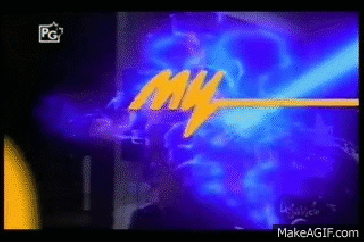Television Turmoil is a look at the worst and weirdest series to make their way onto the small screen.
The action-adventure genre has long been the backbone of many networks’ programming schedules. While never the most popular shows on air, they provided a bit of flavor to the slew of sitcoms and procedurals that populated broadcast networks for decades. By the late 80s, the genre’s increased production costs made it a hard sell to the networks. Luckily, syndication proved to be a viable alternative for many programs to find success. Superhero fare, children’s shows, even international productions lasted multiple seasons thanks to the boom in syndicated programming.
My Secret Identity found success by mashing together all of those elements into a vaguely Canadian stew. Airing on CTV in the Great North and weekend syndication in the States, the show followed the adventures of Andrew Clements (Jerry O’Connell, a few years removed from Stand by Me). While doing some work for neighborhood mad scientist, Dr. Benjamin Jeffcoate (Derek McGrath), Andrew steps in front of a photon beam and develops superhuman powers. Deciding that with great power comes great show concept, Andrew resolves to become a superhero with help from the reluctant Jeffcoate. For reasons that mostly boil down to “because that’s the title of the show,” Andrew keeps his powers secret from his mother (Wanda Cannon), sister (Marsha Moreau), and best friend, Kirk (Christopher Bolton). All of whom have moments where they almost uncover his double life, when they aren’t slumming it in b-plots.

Setting itself apart from most superhero programs, My Secret Identity never has Andrew don a costume. He uses the name Ultraman for most of the first season before unceremoniously dropping it (probably when the creators found out about that guy overseas). The show mostly uses its superpowered adventures as a way of teaching lessons to the kids watching. Sure, Andrew usually finds himself in a fight at some point in an episode, but not without learning the importance of trusting your friends or how to share your feelings properly.
Perhaps the most surprising thing about My Secret Identity, especially when compared to the previous syndicated kids‘ shows we’ve covered, is that it’s distinctly not bad. That sounds a bit like damning with faint praise, but any praise is welcome in this temple of snark and disregard that I’ve built. It might not be riveting television, but the program strikes a nice balance between cheesy humor and fun superhero antics. This is mostly thanks to O’Connell and McGrath, who elevate the boilerplate material with their comedic chemistry. In fact, this show holds the distinction of being the only program I’ve covered to win an Emmy Award. Sure, it was an International Emmy Award, but that still counts.
Make no mistake, My Secret Identity is not immune to some of the same things that plague other shows in this column. Bad dialogue, poor effects, and repetitive stories are just some things that plague the program. The repetitive plotlines are perhaps the most grating element. Most episodes involve Andrew meeting a girl who he immediately has the hots for. A surprising number of them end up kidnapped or in some other danger that requires superheroic intervention. In the rare instance that a girl is not around, then it is time for the seemingly monthly dissolution of Andrew and Kirk’s friendship. Sometimes that too involves a girl! It’s a bevy of similar plotlines that all end mostly the same way.
There is also the curious case of Andrew’s superpowers. Included in his standard superhero power-set of incredible strength and invulnerability, Andrew also has the ability to fly. In the first season, while he can achieve weightlessness, he needs an external force to move through the air, leading to him carrying around cans of aerosol spray. This gets dropped in the later seasons, no doubt because of the rising cost of aerosol cans, and Andrew can now fly unassisted. Andrew also loses his powers when exposed to radiation, which is apparently rampant in Canada with how frequently it comes into play.

My Secret Identity ran for three full seasons before ending its run in May 1991. There isn’t an official reason for the cancellation, but O’Connell was clearly aging out of the early teenage audience that the show was aiming for. Coupled with the show sidelining a lot of the superhero elements in favor of teenage melodrama, that likely put the writing on the wall. There is only so much budget you can cut before you’ve removed an entire show’s premise.
Jerry O’Connell has clearly gone on to bigger fame since the show’s end. Nowadays, this is nothing more than an odd footnote to find on his IMDb page. Derek McGrath continued to find success as a character actor, mostly in TV roles. The rest of the cast didn’t fare nearly as well as the two leads. That’s expected given how much the show sidelined them. Still, it’s easy to see why some folks have a fondness for My Secret Identity. It’s goofy fun that doesn’t take itself seriously, sometimes that’s all you need in your TV shows.
Next Time: We go to the one part of Lucille Ball’s career that Aaron Sorkin won’t touch in Life With Lucy.
As always, thanks for reading! If you have any suggestions for future shows you want to see covered, leave them in the comments below. For more great content, follow me on Twitter @JesseSwanson.


You must be logged in to post a comment.